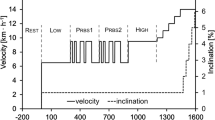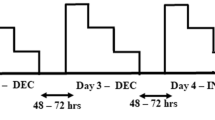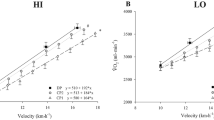Abstract
The purpose of this study was three-fold: (1) to characterise both the on- and off-transient oxygen uptake (V̇O2) kinetics in endurance runners during moderate-intensity treadmill running; (2) to determine the degree of symmetry between on- and off-transients; and (3) to determine the reproducibility of V̇O2 kinetic parameters in endurance runners. Twelve endurance-trained runners [mean (SD) age 25.2 (4.7) years, body mass 70.1 (9.7) kg, height 179.5 (7.5) cm, ventilatory threshold (VT), 3,429 (389) ml.min−1, maximal V̇O2 (V̇O2max) 4,138 (625) ml.min−1] performed two multiple square-wave transition protocols on separate days. The protocol consisted of six (three transitions, 15 min rest, three transitions) square-wave transitions from walking at 4 km.h−1 to running at a speed equivalent to 80% of the V̇O2 at the VT (80%VT). To determine the reproducibility, the protocol was repeated on a separate day (i.e. a test-retest design). Pulmonary gas-exchange was measured breath-by-breath. The V̇O2 data were modelled [from 20 s post-onset (or offset) of exercise] using non-linear least squares regression by a mono-exponential model, incorporating a time delay. The on- and off-transient time constants (τon and τoff), mean response times (MRTon and MRToff) and amplitudes (Aon and Aoff) were obtained from the model fit. On- and off transient kinetics were compared using paired t-tests. The reproducibility of each kinetic parameter was explored using statistical (paired t-tests) and non-statistical techniques [95% limits of agreement (LOA, including measurement error and systematic bias) and coefficient of variation (CV)]. It was found that the τon [12.4 (1.9)] was significantly (P<0.001) shorter than τoff [24.5 (2.3) s]. Similarly, MRTon [27.1 (1.9) s] was shorter than MRToff [33.4 (2.2) s]. With respect to the reproducibility of the parameters, paired t-tests did not reveal significant differences between test 1 and test 2 for any on- or off-transient V̇O2 kinetic parameter (P>0.05). The LOA for τon (1.9 s), τoff (2.3 s), MRTon (1.2 s), MRToff (3.2 s), Aon (204 ml.min−1) and Aoff (198 ml.min−1) were narrow and acceptable. Furthermore, the measurement error (range, 4.3 to 15.1%) and CV (1.3 to 4.8%) all indicated good reproducibility. There was a tendency for τoff to be more reproducible than τon. However, MRTon was the most reproducible kinetic parameter. Overall, the results suggest that: (1) a multiple square-wave transition protocol can be used to characterise, reproducibly, both on- and off-transient V̇O2 kinetic parameters during treadmill running in runners; (2) the phase II time constant is independent of V̇O2 max, and (3) asymmetry exists between on- and off transient V̇O2 kinetic parameters.





Similar content being viewed by others
References
Atkinson G, Nevill AM (1998) Statistical methods for assessing measurement error (reliability) in variables relevant to sports medicine. Sports Med 26:217–238
Barstow TJ, Buchthal S, Zanconato S Cooper DM (1994) Muscle energetics and pulmonary oxygen uptake kinetics during moderate exercise. J Appl Physiol 77:1742–1749
Bauer TA, Regensteiner JG, Brass EP, Hiatt WR (1999) Oxygen uptake kinetics during exercise are slowed in patients with peripheral arterial disease. J Appl Physiol 87:809–816
Beaver WL, Lamarra N, Wasserman K (1981) Breath-by-breath measurement of true alveolar gas exchange. J Appl Physiol 51:1662–1675
Beaver WL, Wasserman K, Whipp BJ (1986) A new method for detecting anaerobic threshold by gas exchange. J Appl Physiol 60:2020–2027
Bird S, Davison R (1997) Physiological testing guidelines (3rd edn). British Association of Sport and Exercise Sciences, Leeds
Bland JM, Altman DG (1986) Statistical methods for assessing agreement between two methods of clinical measurement. Lancet 1:307–310
Burnley M, Jones AM, Carter H, Doust JH (2000) Effects of prior heavy exercise on phase II pulmonary oxygen uptake kinetics during heavy exercise. J Appl Physiol 89:1387–1396
Carter H, Jones AM, Barstow TJ, Burnley M, Williams CA, Doust JH (2000) Oxygen uptake kinetics in treadmill running and cycle ergometry: a comparison. J Appl Physiol 89:899–907
Carter H, Jones AM, Maxwell NS, Doust JH (2002) The effect of interdian and diurnal variation on oxygen uptake kinetics during treadmill running. J Sports Sci 20:901–909
Cautero M, Beltrami AP, Di Prampero PE, Capelli C (2002) Breath-by-breath alveolar oxygen transfer at the onset of step exercise in humans: methodological implications. Eur J Appl Physiol 88:203–213
Cerretelli P, Pendergast D, Paganelli WC, Rennie DW (1979) Effects of specific muscle training on V̇O2 on-response and early blood lactate. J Appl Physiol 47:761–769
DeVries HA, Wiswell RA, Romero G, Moritani T, Bulbulian R (1982) Comparison of oxygen kinetics in young and old subjects. Eur J Appl Physiol Occup Physiol 49:277–286
Fawkner SG, Armstrong N, Potter CR, Welsman JR (2002) Oxygen uptake kinetics in children and adults after the onset of moderate-intensity exercise. J Sports Sci 20:319–326
Gerbino A, Ward SA, Whipp BJ (1996) Effects of prior exercise on pulmonary gas-exchange kinetics during high-intensity exercise in humans. J Appl Physiol 80:99–107
Grassi B, Poole DC, Richardson RS, Knight DR, Erickson BK, Wagner PD (1996) Muscle O2 uptake kinetics in humans: implications for metabolic control. J Appl Physiol 80:988–998
Griffiths TL, Henson LC, Whipp BJ (1984) Influence of inspired oxygen concentration on the dynamics of the exercise hyperpnoea in man. J Physiol (Lond) 380:387–403
Gronlund J (1984) A new method for breath-to-breath determination of oxygen flux across the alveolar membrane. Eur J Appl Physiol Occup Physiol 52:167–172
Harms SJ, Hickson RC (1983) Skeletal muscle mitochondria and myoglobin, endurance and intensity of training. J Appl Physiol 54:798–802
Henriksson J, Reitman JS (1976) Quantitative measures of enzyme activities in type I and type II muscle fibres of man after training. Acta Physiol Scand 97:392–397
Holloszy JO, Coyle EF (1984) Adaptations of skeletal muscle to endurance exercise and their metabolic consequences. J Appl Physiol 56:831–838
Hughson RL, Sherrill DL, Swanson GD (1988) Kinetics of V̇O2 with impulse and step exercise in humans. J Appl Physiol 64:451–459
Jones AM, Doust JH (1996) A 1% treadmill grade most accurately reflects the energetic cost of outdoor running. J Sports Sci 14:321–327
Kilding AE, Fysh M, Winter EM, Challis NV (2001) Test-retest reproducibility of measures of oxygen uptake kinetics. In: Proceedings of the 6th annual congress of the European college of sport sciences, Cologne, 24–29 July 2001, p 941
Koppo K, Bouckaert J, Jones AM (2004) Effects of training status and exercise intensity on phase II V̇O2 kinetics. Med Sci Sports Exerc 36:225–232
Kushmerick MJ (1998) Energy balance in muscle activity: Simulations of ATPase coupled to oxidative phosphorylation and to creatine kinase. Comp Biochem Physiol B Biochem Mol Biol 120:109–123
Lamarra N (1990) Variables, constants, and parameters: clarifying the system structure. Med Sci Sports Exerc 22:88–95
Lamarra N, Whipp BJ, Ward SA, Wasserman K (1987) Effect of interbreath fluctuations on characterizing exercise gas exchange kinetics. J Appl Physiol 62:2003–2012
Linnarson D (1974) Dynamics of pulmonary gas exchange and heart rate changes at the start and end of exercise. Acta Physiol Scand 415:1–68
Norris SR, Petersen SR (1998) Effects of endurance training on transient oxygen uptake responses in cyclists. J Sports Sci 16:733–738
Özyener F, Rossiter H, Ward S, Whipp B (2001) Influence of exercise intensity on the on- and off-transient kinetics of pulmonary oxygen uptake in humans. J Physiol (Lond) 533:891–902
Paterson DH, Whipp BJ (1991) Asymmetries of oxygen uptake transients at the on- and offset of heavy exercise in humans. J Physiol (Lond) 443:575–586
Phillips SM, Green HJ, MacDonald MJ, Hughson RL (1995) Progressive effect of endurance training on V̇O2 kinetics at the onset of submaximal exercise. J Appl Physiol 79:1914–1920
Powers SK, Dodd S, Beadle RE (1985) Oxygen uptake kinetics in trained athletes differing in V̇O2 max. Eur J Appl Physiol 54:306–308
Puente-Maestu, Sanz ML, Sanz P, Ruiz de Ona JM, Rodriquez Hermosa JL, Whipp BJ (2000) Effects of two types of training on pulmonary and cardiac responses to moderate exercise in patients with COPD. Eur Respir 15:1026–1032
Rossiter HB, Ward SA, Doyle VL, Howe FA, Griffiths JR, Whipp BJ (1999) Inferences from pulmonary O2 uptake with respect to intramuscular [phosphocreatine] kinetics during moderate exercise in humans. J Physiol (Lond) 518:921–932
Rossiter HB, Ward SA, Kowalchuk JM, Howe FA, Griffiths JR, Whipp BJ (2002) Dynamic asymmetry of phosphocreatine concentration and O2 uptake between the on- and off-transients of moderate- and high-intensity exercise in humans. J Physiol (Lond) 541:991–1002
Tschakovsky ME, Hughson RL (1999) Interaction of factors determining oxygen uptake at the onset of exercise. J Appl Physiology 86:1101–1113
Wasserman DH, Whipp BJ (1983) Coupling of ventilation to pulmonary gas exchange during non steady-state work in men. J Appl Physiol 54:587–593
Whipp BJ, Mahler M (1980) Dynamics of pulmonary gas exchange during exercise. In: West JB (ed) Pulmonary gas exchange: organism and environment. Academic, New York, pp 33–98
Whipp BJ, Ward SA, Lamarra N, Davis JA, Wasserman K (1982) Parameters of ventilatory and gas exchange dynamics during exercise. J Appl Physiol 52:1506–1513
Williams CA, Carter H, Jones AM, Doust JH (2001) Oxygen uptake kinetics during treadmill running in boys and men. J Appl Physiol 90:1700–1706
Yoshida T, Whipp BJ (1994) Dynamic asymmetries of cardiac output transients in response to muscular exercise in man. J Physiol (Lond) 480:355–359
Author information
Authors and Affiliations
Corresponding author
Rights and permissions
About this article
Cite this article
Kilding, A.E., Challis, N.V., Winter, E.M. et al. Characterisation, asymmetry and reproducibility of on- and off-transient pulmonary oxygen uptake kinetics in endurance-trained runners. Eur J Appl Physiol 93, 588–597 (2005). https://doi.org/10.1007/s00421-004-1232-0
Accepted:
Published:
Issue Date:
DOI: https://doi.org/10.1007/s00421-004-1232-0




